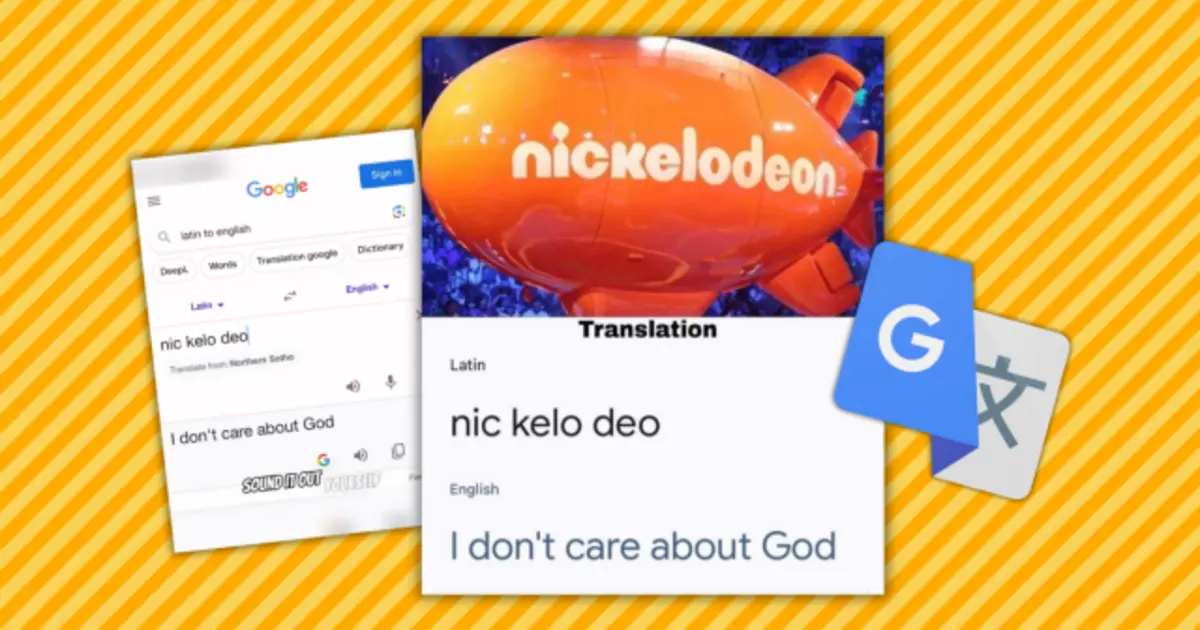Misinformation can spread like wildfire in the age of social media. One baffling instance is the recent conspiracy theory concerning the name “Nickelodeon.” A few conspiracists have said that when dissected and interpreted from Latin, Nickelodeon’s name has concealed anti-Christian messages. It’s time we dived into this sensational claim, debunked it, and revealed what is behind its appellation.
Table of Contents
The Origins of the Nickelodeon Conspiracy
On platforms like Twitter and TikTok, there was a buzz about the Nickelodeon conspiracy theory; some people claimed that the name of the children’s network had an evil meaning when translated from Latin. These claims say that if you remove “n” from Nickalodian, break it into three parts (nic kelo deo), and then translate it with Google Translate, it will be “I don’t care about God.”
Several posts and videos have claimed hidden meanings in their channel names, which parents must keep away from kids. However, these outrageous allegations have been ridiculed on platforms like Reddit compared to similar brand name conspiracy theories.
What Does Nickelodeon Mean in Latin?
Debunking the Misinterpretation: The Role of Translation Tools
To understand the truth behind this conspiracy, let’s examine the translations. According to the theory, translating “nic kelo deo” using Google Translate results in “I don’t care about God.” However, several issues arise with this claim:
Translation from English to Latin:
Translating “I don’t care about God” into Latin using Google Translate gives us “Non curo Deum,” not “nic kelo deo.”
Translation from Latin to English:
When we translate “nic kelo deo” back into English using Translate.com, the result is “God bless you,” which contradicts the original claim.
One Reddit user pointed out that “Kelere” isn’t a Latin word. It might be “celo,” which means “I hide.” Additionally, “Deus” (God) would need to be in the accusative case (direct object), resulting in “Deum.” Thus, a more accurate translation might be “nec celo deo,” meaning “I don’t hide from God,” but even this is a stretch.
Expert Insights: Clarifying the Meaning with a Latin Language Expert
We consulted Dr. Maria Antonius, a Latin language expert, to further clarify. Dr. Antonius confirms that “nic kelo deo” is not a legitimate Latin phrase.
“The phrase ‘nic kelo deo’ is a nonsensical construction in Latin. The Latin word for ‘care’ is ‘curare,’ not ‘kelo.’ And the word for God is ‘Deus,’ which would likely be in a different case if used in such a phrase. The supposed translation is simply a misuse of the language,” she explains.
Dr. Antonius adds that relying on automated translation tools can often result in inaccuracies. A proper understanding of Latin grammar and syntax is essential for accurate translations, something that translation algorithms may only sometimes handle correctly.
Historical Background: The True Etymology of “Nickelodeon”
It has a vast history that is very far from any assumptions of anti-Christianity. According to the Encyclopedia Britannica, nickelodeons were early motion-picture theatres that charged just five cents for admission. Nickelodeon is derived from “nickel,” representing the five-cent admission cost, and “odeon,” a Greek-based derivation of the word “ōideion”, used about a building for musical performances.
The etymology reveals how the word emerged as an entertainment term in the early 20th century and became associated with cultural access on affordable terms. The idea of a secret Latin message is silly and has no bearing on the history or linguistics of that term at all.
Misinformation Spread on Social Media: Social Media Dynamics
Nickelodeon conspiracy theories quickly go viral on social media, underlining how misinformation spreads easily there. Platforms like Twitter and TikTok can amplify baseless claims, but they also have features that facilitate debunking them or spreading accurate information.
On Reddit, this theory was promptly debunked by users who posted comments stating how ridiculous such claims are. For example, one user said, ‘“Words like ‘nickelodeon’ and proper names like ‘Balenciaga’ have nothing to do with atheism or satanism. You can’t just whack off an entire letter of a word and then try to claim that it has some hidden satanic meaning.’
It shows how community-driven platforms have the power to correct misinformation and highlights the need for critical thinking when faced with sensationalist online claims.
Conclusion: What Does Nickelodeon Mean in Latin? Find Out Here!
For these reasons, the Nickelodeon conspiracy theory stands as an extreme case of how misinformation can operate in the present era, where social media dominates. The Latin word “Nickelodeon” lacks a secret anti-Christ meaning, and thus, this idea arose from misunderstanding and misinterpretation.
We should, therefore, use logic and trust what we get from authentic sources so that we do not become victims of wild allegations without facts provided. We must always question, verify, and critically appraise anything we read or hear online.
Therefore, we should focus on accuracy while talking online with others and encourage them to follow suit. When misinformation is rampant, an informed community becomes our greatest weapon against it.

